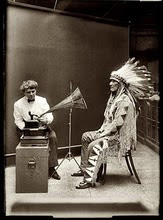
William McDonough, author of Cradle to Cradle, is the most intelligent voice in the clean tech movement right now. In 1999, Time Magazine recognized him as a "hero of the planet." His book itself is published on Durabook "paper," constructed of a paper-like plastic that can be recycled without loosing structural integrity, and is waterproof, to boot (as seen above). McDonough's day-job is as founder of William McDonough + Partners, a leading architectural firm. He's designed the world's largest grass roof (10.4 acres) for a Ford Motor Company plant in Dearborn, Michigan. On the first day, the plant saved Ford $35 million dollars in operating costs. McDonough has been contracted by the Chinese government to build 12 entire cities along the Cradle to Cradle model. If this makes enough business sense to woo billions of dollars from the stereotypically un-environmental Ford Motor Company and People's Republic of China, might it be good enough for you?
His Cradle to Cradle innovation is to imagine a "technological metabolism" modeled upon the "biological metabolism" which we're all well-familiar. There is no waste in nature, dead animals and plants are broken down and turned into nutrients for the soil (even rocks and metal become the iron, zinc, magnesium "minerals" in our dinner). Waste=Food. Materials are then not created and then thrown away, they are constructed, broken down and re-constructed in an sustainable, wasteless circuit. Traditional recycling, on the other hand, is mere "downcycling" because the papers and plastics that are recycled become lower and lower quality with each recycling until they are useless and are thrown into landfills anyway. The recycling process itself is often more polluting that simply making a new plastic bottle. Why not make goods that can be created, destroyed, and then recreated, without any waste? Why not design them that way from the start? It saves materials, and therefore money. The trees are happy, and so are the accountants.
Watch him speak to the TED Conference in 2005:





No comments:
Post a Comment